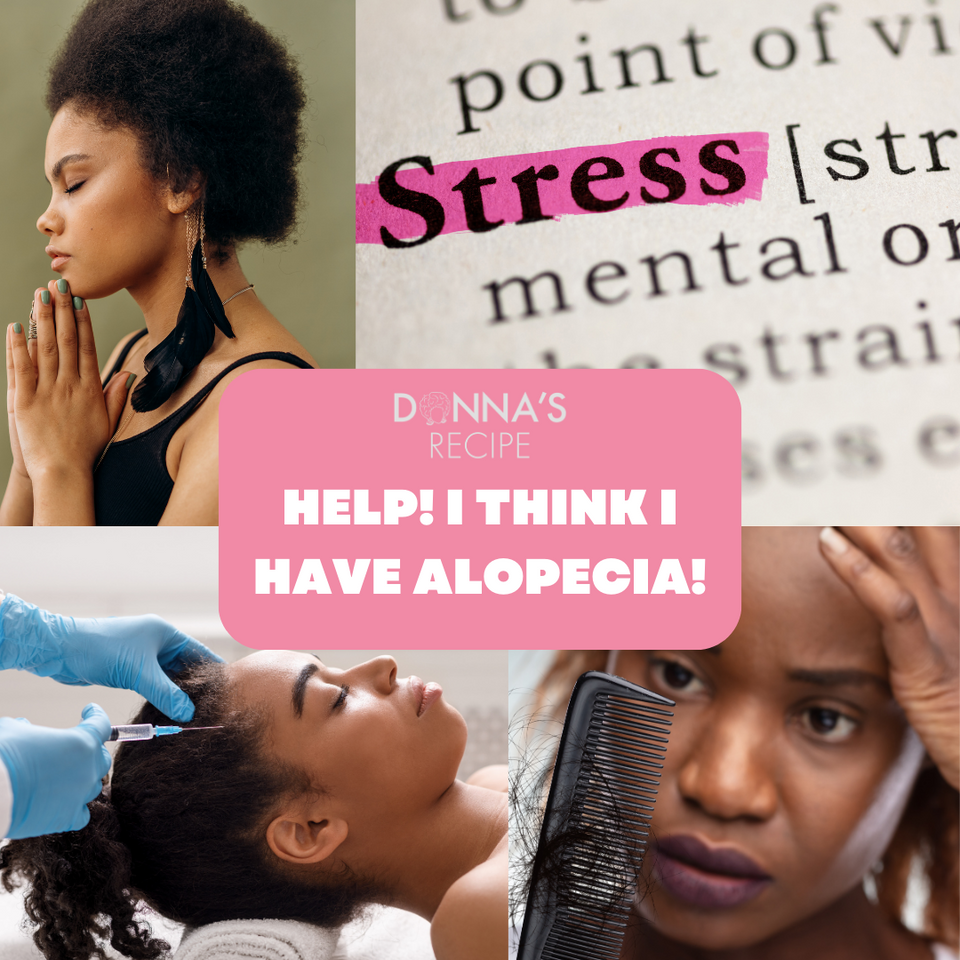Let's start off with what alopecia is exactly. Alopecia is a medical condition that affects the hair follicles and can lead to hair loss. It's important to keep stress level down as much as possible and know that there are action steps that you can take to help to control either the spread and/or worsening of the condition.
If you suspect you have alopecia, it's essential to take steps to address your concerns and seek professional medical guidance. Here are some steps to follow:
-
Consult a Healthcare Professional: The first and most crucial step is to consult with a healthcare provider, preferably a dermatologist that specializes in hair loss. They specialize in diagnosing and treating skin and hair disorders, including alopecia. Describe your symptoms and concerns honestly during your appointment. If you are a person of color, you may prefer to seek a dermatologist person of color. Dr. Yolanda Lenzy shared on a Donna's Recipe Live stream that only 3% of dermatologist are of African descent. She followed up by recommending a site called www.blackdermdirectory.com to search for a person of color in your area.

-
Medical Evaluation: The dermatologist will conduct a thorough examination of your scalp and hair to assess the extent of hair loss, check for any underlying skin conditions, and determine the type of alopecia you may have.
-
Medical History: Be prepared to provide your medical history, including any family history of hair loss, as this can be relevant to your diagnosis.
-
Diagnostic Tests: In some cases, the dermatologist may order blood tests or perform a scalp biopsy to help confirm the diagnosis and rule out other potential causes of hair loss.
-
Treatment Options: Once diagnosed, your dermatologist will discuss treatment options based on the type and severity of alopecia you have. Treatment may include topical treatments, oral medications, injectable steroids, or other therapies, depending on the specific diagnosis.
-
Lifestyle Changes: In addition to medical treatments, your dermatologist may recommend lifestyle changes to help manage and reduce hair loss. This could include stress reduction techniques, dietary adjustments, and hair care practices. Many styles that include pulling and manipulation to your hair and scalp should be completely avoided.

-
Support and Coping: Coping with hair loss can be emotionally challenging. Seek support from friends, family, or a therapist if needed. Support groups for individuals with alopecia can also be helpful in connecting with others who are experiencing similar challenges. Know that you are not alone and About one-third of women experience hair loss (alopecia) at some time in their lives; among postmenopausal women, as many as two-thirds suffer hair thinning or bald spots. We encourage you to follow us on Instagram (@DonnasRecipe) as we have many live discussions surrounding hair and scalp health.

-
Follow-Up Appointments: It's essential to follow up with your dermatologist as recommended to monitor your progress and adjust treatment if necessary. Share what is and what is not working.
-
Wig or Hairpiece Options: Depending on the extent of hair loss and personal preferences, you may explore options like wigs or hairpieces to help manage the cosmetic aspect of alopecia. Try to keep any wigs off when you can such as home & going to sleep. Rubbing of the wig can also cause irritation to the scalp as well.
-
Massage: Massaging the scalp is a great way to stimulate your follicles. Our Strength Hair Oil is great as it contains 18 natural oils and powders without the fluff. It helps with the following:
-
Reduction of Scalp Inflammation: Inflammatory conditions of the scalp, like alopecia areata, can contribute to hair loss. Massaging natural oils onto the scalp can help reduce inflammation and soothe irritation.
-
Relaxation and Stress Reduction: The act of massaging the scalp can be relaxing and stress-reducing. Chronic stress is a known factor that can contribute to hair loss, so reducing stress through scalp massage may indirectly benefit individuals with alopecia.
-
Enhanced Penetration of Topical Treatments: Scalp massages can improve the absorption of topical treatments prescribed by dermatologists for alopecia. The massage helps these treatments penetrate the scalp more effectively.
-
Encouragement of Hair Follicle Activity: Massaging the scalp can awaken dormant hair follicles, encouraging them to transition from the resting (telogen) phase to the growth (anagen) phase. This can lead to increased hair density and thickness over time.





















